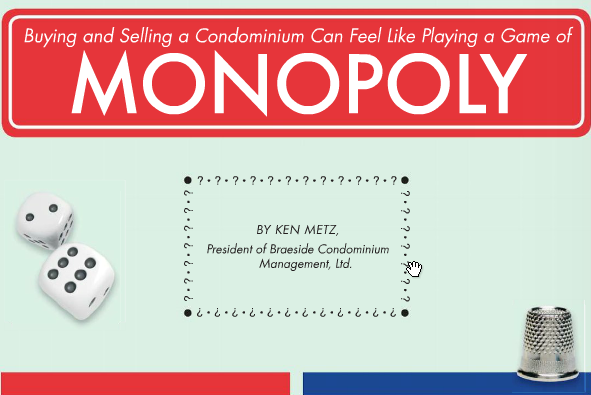So you landed in Park Place and decide this is the perfect home for you. You sign the contract and look forward to paying the bank and moving in. It is just like the game, Monopoly. Not so fast – you have decided to move into a condominium!
Condominium living offers many fantastic benefits and attracts a wide array of buyers. Condominium buildings and associations vary drastically so there is a great deal of diligence needed to ensure the association will be a good fit for you. Thankfully, there are laws to help a buyer gather the information needed to make a smart buying decision, but what happens when the association decides it wants to make sure YOU are a good fit for IT?
New homeowners should feel like they have landed on Park Place and be welcomed into the community. A new owner with a poor first experience with an association is less likely to volunteer and become an active member of the association. So where in this process do things sometimes go wrong?
Many (but not all) condominium declarations and/or bylaws, particularly older ones, grant the association a Right of First Refusal on the sale or lease of a condominium unit. Some boards incorrectly interpret this as an opportunity to select neighbors which, due to anti-discrimination laws, may place the association at risk of significant penalties. Oops – you may have just picked up a “Do Not Pass Go, Go Directly to Jail” card!

In order for an association to exercise its right of first refusal, the association must have:
- The authority to purchase the unit (most declarations require significant homeowner approval to make large capital purchases);
- Funds to purchase the unit; and
- A business reason to purchase the unit.
Given the challenges of exercising the right of first refusal, it is rarely practical in today’s market. In addition, a board that is contemplating exercising its right of first refusal should have a clear policy in place on this matter and consult the association’s attorney before taking any action.
Don’t land on “Chance.” Some boards take a chance and withhold providing a waiver because they first want to review the buyer’s information and conduct an interview with the potential buyer. They do this simply because this is how they have always done it. The times and laws have changed, and causing a sale to fall through by unreasonable delays may cause financial harm to both the buyer and the seller. This may also result in a damage claim against the association, particularly if the board cannot demonstrate it had the authority, opportunity and business reason to follow through with exercising the right of first refusal.
So why withhold the waiver? If it is the association’s goal to require a new owner orientation to review policies and rules of the association, then the board should consider alternative methods to obtain compliance. While new owners receive the rules and regulations of the association, they rarely have the time during this busy moving process to read and understand all of the rules.
Instead, consider these suggestions:
- Provide a simple, easy-to-read, excerpt from the rules and regulations that relate to moving;
- Require a move deposit that is subject to refund after the move is complete and a new owner orientation has taken place.
Don’t take any chances and know the rules of the game. Associations are encouraged to review their rules, regulations and policies with their attorneys to ensure compliance with laws and industry best practices. Avoid having to need that “Get Out of Jail Free” card and instead pass “Go” and enjoy life on Park Avenue!
Ken Metz, President








